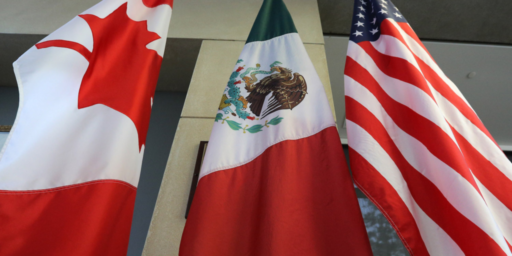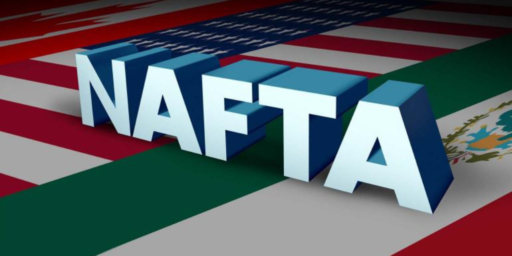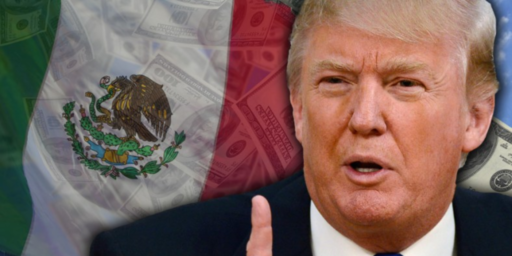The Deep Significance and Importance of NAFTA
As with so many things, the President is demonstrating that he really doesn't know what he is doing.
 Dan Drezner has a column (The missing dimension in the NAFTA debate) that is worth a read and hits on something I have been thinking about in the context of US-Mexicans relations:
Dan Drezner has a column (The missing dimension in the NAFTA debate) that is worth a read and hits on something I have been thinking about in the context of US-Mexicans relations:
An increasing fraction of America’s voting population has no memory of pre-NAFTA Mexican American relations. It would be safe to describe them as “prickly.” The biggest reason for negotiating NAFTA was for the Mexican government to lock in domestic economic reforms that rejected import substitution policies and integrated the country into the global economy. One of the knock-on effects was for Mexico to transform from a one-party state to a real democracy. The result is a country that views itself as North American.
This is absolutely the case. Indeed, go back and read that paragraph again and contemplate the significance of the situation. Many may assume that US-Mexican relations have always been warm and based, if anything, on proximity and shared history. However, this is not the case. For one thing, that shared history has a lot of contentious features, not the least of which being the fact that in the 1840s the US fought a war with Mexico over the border with Texas and ended up getting most of what is now the western United States. If you don’t think something like that doesn’t leave a lingering bad taste for decades, you haven’t read much history. If we set aside the 19th century and we were to go back about a century from today we would find a conflict-ridden relationship between the US and Mexico (which might have something to do with US military incursions into Mexico during the Revolution). Beyond that, the bulk of the rest of the century was one of semi-distrustful (if not fully distrustful) tolerance. Yes, there was some trade, but Mexico had a very inward-looking economy and the US was distracted by the Cold War. It was not until the Bush administration’s talks with the Salinas government that this began to change. It is not hyperbole to suggest a major contributor to Mexican democratization was NAFTA because the Mexican government made the decision to liberalize and look outward after a truly disastrous 1980s (a.k.a., “The Lost Decade”).
If the US really does withdraw from NAFTA it will be setting back, and perhaps derailing, a very friendly and important relationship with our neighbors to the south. And, ironically, make the immigration problem that trumpistas are so focused on much, much worse (because a bad Mexican economy means looking to el Norte for jobs).
Drezner points to a piece in National Review by José Cárdenas which rightly points out the following regarding domestic Mexican politics:
Economic trouble in our southern neighbor should be on the radar screen of any U.S. president, but what makes the current situation that much more dangerous is that the person who stands to gain most from the turmoil is Mexican opposition politician André Manuel López Obrador, a left-wing populist rabble-rouser in the mold of the late Venezuelan president Hugo Chávez. López Obrador is running for the Mexican presidency (for the third time) in 2018.
In the past, AMLO, as he is known, has tested the patience of Mexicans with his demagoguery and penchant for mobilizing people in the streets, disrupting daily life. However, his strident rhetoric, appeals to nationalism, and rejection of politics as usual in Mexico may represent just the kind of leadership that Mexicans want to confront the Trump phenomenon. Over the course of the past year, AMLO’s approval numbers have been steadily improving. A recent poll showed 27 percent of Mexicans supporting his National Regeneration Movement, against the rightist National Action party, with 24 percent, and Peña Nieto’s PRI (Institutional Revolutionary party), with 17 percent.
The degree to which AMLO is a Chávez may be debatable, but I can guarantee that he would not be a positive political force as far as the US is concerned. AMLO came within a whisker of winning the presidency in 2006 (he lost by about half a percentage point), so the notion that he could win the presidency, especially in tumultuous times, is a reasonable one. This is especially true since Mexico awards the presidency by plurality and there are often three strong contenders (the US and Mexico both would be advised to do to a popular vote with a majority requirement, just something else the two countries have in common).
As with so many things, the President is demonstrating that he really doesn’t know what he is doing and his ignorance could cause some serious problems for the long haul.






Trump is adept at appealing to bigots. Although there are some genuine concerns about trade and employment, a lot of the howling about Mexico is driven by race hate rather than by substantive policy issues.
This sort of thing makes the bigots very happy because it gives them a chance to express their hatred. Some folks could use some better hobbies.
The man is Dunning-Kruger incarnate.
Like the EU, there are so many good reasons for binding North America as a region together as an economic union that have nothing to do with economics. On a related topic, Brad DeLong has a interesting article at VOX explaining that NAFTA, TPP or China joining the WTO had very little to do with the decline of American manufacturing.
If there’s one unifying factor in Trump and his followers, it’s their total focus on short-term “solutions” that will lead to long-term problems.
It would be hard to find a more perfect example of the intellectual corruption and degenerate citizenship that resulted in President Trump than this post.
“You Americans criticizing NAFTA are so stupid because you don’t realize how good it’s been for Mexico!”
Spend 20+ years militantly ignoring the actual problems produced by a trade deal and, at times, venomously refusing to even acknowledge people’s concerns and then act surprised when it results in a frustrated overreaction? There’s some stupid folks in that equation but it is neither Trump nor Trump supporters.
I am old enough to remember NAFTA being sold to the American people. “It’ll be wonderful for political liberalization in Mexico” was not one of the arguments made at the time. And if it hasn’t been quite the job-sucking disaster opponents feared, neither has it been the economic panacea promised by its advocates. Just go ask Mexican small farmers about that.
If we’d dealt with these issues seriously, Trump wouldn’t be President now. Instead, people who were insulated from the negative impacts of NAFTA, and insulated by circumstance and not merit, turned a blind eye and a deaf ear to the suffering of their fellow citizens. Now you want to lecture THEM for not understanding the issue?
Mike
You can’t fix stupid.
@MBunge:
You’re severely mixed up and are just making strawmen.
@MBunge:
Show me where Dr. Taylor said anything that sounds remotely like that.
There is a small textile mill up the road that has managed to stay in business and is actually doing very well. They use a lot of technology. There facility is well lit, air conditioned, quiet, and safe. The workers are above minimum wage. They market t-shirts to different retailers. You can walk into their outlet shop and buy them for $6 each. (called imperfects, but no visible defects). They also sell to the local sports teams and organizations.
I had a friend who worked in a mill years ago that made underwear and socks. They put different labels on them depending on the company that bought them. So people were paying different amounts for the same items ! That is why I wonder about some of these hooded sweat shirt jackets that are going for $50 – $100. Are they really worth that ? Especially down here in with short, mild winters.
@gVOR08: I was trying to figure that out as well.
Ah yes, the straw man “argument”.
When you don’t have the facts on your side……just accuse someone of creating a straw man.
@Jane: Or, quite often, someone is actually creating a strawman.
When I typed “mike bunge intelligent comment” into a search engine, the only thing that came up was this:
https://www.youtube.com/watch?v=yLmd0100T9g
@Sleeping Dog: It’s good to see DeLong moving away from his recent hobby horse–if only the poor would marry, then they would be able to join the middle class, too, because married people on average have higher incomes.
@MBunge:
So am I. Where we differ is that I can also remember that no one in America would have cared about that as a reason even as much as one might now (which is still very low care level).
@Just ‘nutha ig’rant cracker: Not arguing, curious. I don’t recall that as a Brad DeLong thing.
So AMLO is kind of a Mexican Trump…..yeah, having a guy like that in charge in Mexico and the U.S. will produce awesome results.
@Tyrell:
That’s standard operating procedure for manufacturers around the world. That’s why about 10 years ago something silly like over 70% of all LCD screens in the world were made by samsung. I learned that bit when I needed a new PSU (Power SUpply) for a monitor I was rebuilding (caps mosfets etc went out in an ugly cascade of fail). The “oem” PSU from westinghouse was about $130 but I found out that samsung used the same PSU in several monitors for other venders. I ended up scoring a replacement PSU from samsung for $30 (same connectors as samsung made the LCD panel for Westinghouse). That monitor has been used HEAVILY in the 8 years since that replacement.
While sometimes the product is exactly the same there are many more times where there are vender requested differences. In your mill example such a difference would be thread count or the quality of the threads themselves.